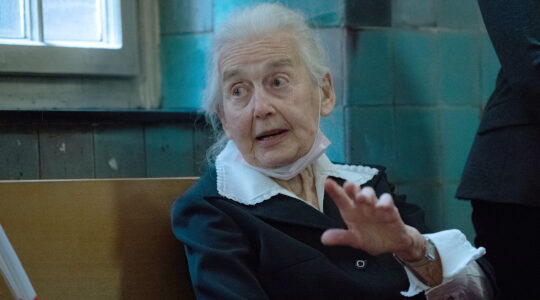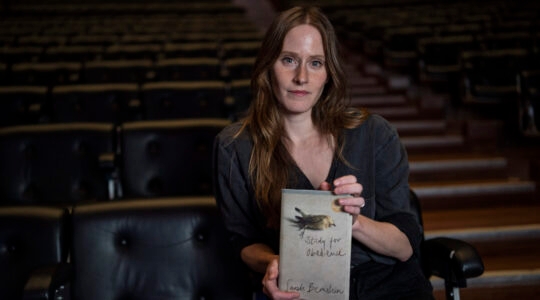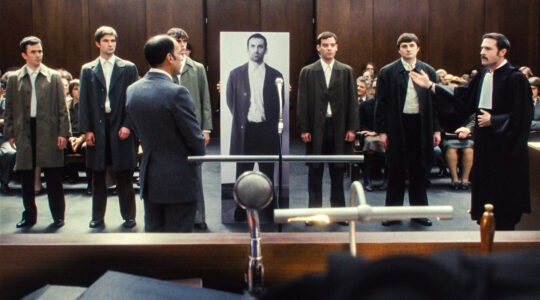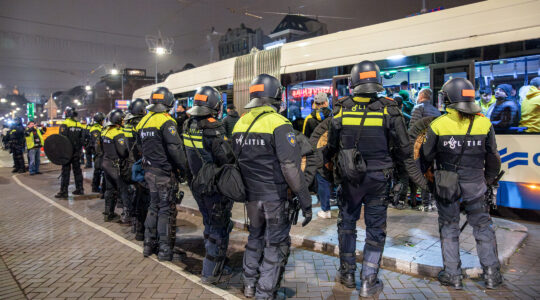BUENOS AIRES (JTA) – Elderly Argentine Jews will soon have a new place they can call home when LeDor VaDor, a $10 million, state-of-the-art facility, opens in Buenos Aires.LeDor VaDor is the first
home for Jewish elderly in the capital that has the community’s central
institutions involved in its direction. The home, which was inaugurated March 27 but will open in May, can hold 292 residents. Hundreds more can participate in daily activities. The cost per resident will be $1,500 to $2,000 per month, but at least 190 residents will have their fees heavily subsidized. The building, a 150,000-square foot, rebuilt factory, is a concrete structure with high ceilings. Patios were designed to provide natural light and open spaces for leisure. The building is located near neighborhoods with large Jewish populations, unlike existing Jewish homes for the elderly on the outskirts of the city that leave residents far from loved ones.The Hirsch Israeli Philanthropic Association is highly regarded but expensive. The once-vigorous Argentine Jewish Home for Elderly in Burzaco, nearly a century old, is foundering under economic and structural problems.Inside the city, the Sephardic Beit Sion Douer can hold only 90 residents and is filled to capacity.That has left many elderly Jews to live in non-Jewish homes that do not provide a Jewish environment. Research two years ago by the American Jewish Joint Distribution Committee showed that 75 percent of the residents in 10 non-Jewish private elderly homes in Buenos Aires were Jewish.The JDC survey also found that some 45,000 Jews in Buenos Aires and its surroundings are older than 60. Local Jewish institutions have developed a network of 40 daily recreation centers for elders, but they aren’t equipped to care for those with disabilities.Three years ago, local Jews, American Jews and Jewish institutions in Argentina and the United States came together to plan a new home for seniors. According to JDC sources, the project was funded by local Jews and institutions, the Harry and Jeanette Weinberg Foundation in Baltimore, the Greater Houston Jewish Federation, the JDC, and the David and Inez Myers Foundation of the Jewish Community Federation of Cleveland.The home was modeled on state-of-the-art elderly facilities in the United States and Israel. Perkins-Eastman, a U.S. architectural firm, offered free advice and supervision for the project. At the opening ceremony, 11 members from the Houston federation, along with Howard Schultz, president of the Latin American JDC Committee, and Mark Weiner, president and CEO of the Council for Jewish Elderly and a consultant to Perkins-Eastman, joined local Jews. National and municipal officials, Israeli Ambassador Rafael Eldad and rabbis from several movements also participated. “The presence of the rabbis here today is very significant,” said Jorge Fainzaig, a local Jewish businessman who is president of the LeDor VaDor Foundation and was one of the driving forces behind the project. “They show us that this project, which seemed to be pharaonic, was done with the help of God.” “We knocked on several doors and everyone opened their hearts and pockets,” he said. Representatives from Argentina’s Social Development Ministry announced a subsidy of $450,000 to buy equipment for the new home. Schultz told JTA it was his fourth visit to Argentina since the initial mission from Houston in 2003.”These sort of projects that show respect for the elders are what distinguishes us as a people,” he said. Weiner came with his Argentine wife, Patricia Voloschin, and their children Daniel, 10, and Samie, 12. Weiner was emotional when he recounted how Samie told him, “Dad, I’m proud of you. You’re helping people you don’t even know.””The lessons I teach my children are that being Jewish is being part of a larger world, in which we’re connected,” he said. Even before the building opens, there are great expectations. “This shouldn’t be just a beautiful mall where we deposit the elderly,” said Alejandro Avruj, one of the rabbis at the opening ceremony. “There’s a lot of work to be done in order to feel that the elders living here will also be our zeydes.”

Help ensure Jewish news remains accessible to all. Your donation to the Jewish Telegraphic Agency powers the trusted journalism that has connected Jewish communities worldwide for more than 100 years. With your help, JTA can continue to deliver vital news and insights. Donate today.





